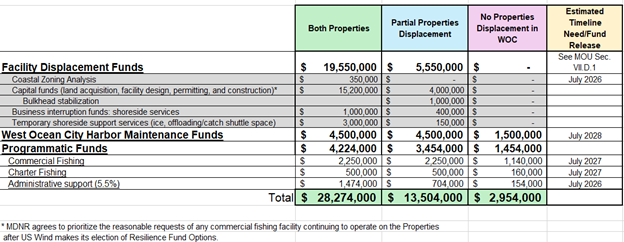The Maryland Department of Natural Resources (DNR) on May 13, 2025 signed a Memorandum of Understanding with offshore wind developer US Wind Inc. to secure funding for commercial and charter fishing operations impacted by the proposed work to build wind turbines in the Atlantic Ocean off the coast of the Delmarva Peninsula.
US Wind also announced it will reduce the footprint of its Operations and Maintenance facility in the West Ocean City Harbor and agreed to provide funds to enhance fish landing operations at the harbor, enabling fish landing services to remain there.
The memorandum and resulting agreement was the culmination of an approximately year-long effort by DNR to solicit input from commercial fishermen and the Ocean City community to address their concerns related to potential impacts to the fishing industry.
DNR developed the memorandum with US Wind and Delaware’s Department of Natural Resources and Environmental Control (DNREC). In addition to direct outreach, DNR held three public meetings to seek input from Maryland-based commercial fishing operators and others who fish in the waters near the offshore wind project area.
The Memorandum of Understanding includes the following funding components:
A
Maryland Multi-Use Resilience Fund: $13.5 million. The Resilience Fund will provide resources to address impacts to fish landing facilities in West Ocean City as well as support harbor maintenance needs and associated fishing businesses. US Wind intends to update its operations and maintenance facility design to use only one of the existing West Ocean City fish landing facilities, or fish houses. The Resilience Fund will make the $13.5 million available for things such as bulkhead stabilization, temporary ice service support, business development, harbor maintenance, and to support new entrants to the local fishing industry. These specific funding needs were identified through discussions with local fishing industry representatives.
Compensatory “Direct” Mitigation Fund: $5.46 million. This money is to mitigate commercial vessel owners, operators and crew–regardless of home port–who have been impacted by the construction, operation, or decommissioning of the wind energy project. The amount is based on estimates of vessel revenues from historical and current federal and state fishery landings data in the offshore project area.
Navigational Enhancement and Training Program (NETP): $1.04 million. The NETP is specific to Maryland and Delaware, the amount was determined by asking the coastal fishing industries what equipment and vendors they preferred to enhance safety and navigation in-and-around the wind energy area and then by determining the eligible number of vessels and individuals. For example, a Maryland ocean-going commercial fishing captain may choose to participate in a radar training or upgrade navigation equipment on their vessel.
More details are available below:
FAQs on Fisheries Compensatory Mitigation
-
What is fisheries compensatory mitigation?
Fisheries compensatory mitigation is generally a monetary compensation paid by offshore wind developers and provided to commercial and for-hire (charter) fishing vessels/operators and related shoreside support businesses for economic losses attributable to the construction, operation, and decommissioning of offshore wind farms.
-
What is included in the Maryland ‘Fishing Community Resilience Fund’ that would support potential impacts to the West Ocean City fish landing facilities where US Wind plans to build its operations and maintenance facility?
Exhibit B of the MOU outlines several forms of funding that would be made available for a Maryland-specific Resilience Fund. Depending on the option, funds are available for items such as capital improvements, harbor maintenance, and programmatic opportunities. The fund options table that can be found in Exhibit B of the MOU is as follows:

-
What does the MOU require of the Maryland coastal commercial and for-hire recreational fishing industry?
Nothing. Maryland fishermen are under no obligation to participate in any of the programs or claims processes. The MOU is for the benefit of the fishing industry, but not on their behalf.
-
When will the compensatory money become available?
Funds will be available on various timelines depending on the form of compensation. For example, direct compensation would be available once offshore project construction begins for fishermen that experience and can document an impact. Resilience fund monies, on the other hand, may be available much sooner than the start of construction depending on when US Wind is able to begin work on their operations and maintenance facility.
-
How much money will be available to fishermen who have fished in the project area?
For direct compensation, the amount of money available to an individual or company will depend in part on past landings from the affected area.
Documents
MDNR-US Wind Letter of Intent (July 2024)
Letter of Intent Extension (November 2024)
MDNR-US Wind MOU (May 2025)
Meetings:
Meeting information about this topic is available through the Fishing and Boating Service calendar events:
Meeting 1- 9/24/24
Meeting 2 - 11/12/24
Meeting 3 - 04/18/25
For the most up-to-date information about the Regional Fund Administrator process, including ways to learn more and be engaged, please visit the:
Fisheries Compensation Program for Atlantic Coast Offshore Wind page.